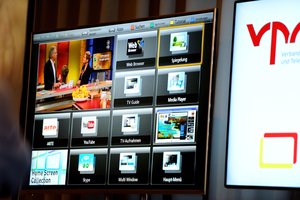

Securing Diversity
Teaser
The work of the Media Authorities focuses on promoting diversity among providers and their output on independent television and radio. Within the scope of licensing procedures and licence monitoring, there is a control on media power to do justice to freedom of opinion and information exchange. The main objective is to prevent concentration of power in the hands of individual media companies.
Text
[Translate to englisch:] Text
At a national level, the Commission on Concentration of Ownership in the Media (KEK) is in place to operate on behalf of the Media Authorities. This is for the purpose of ensuring diversity in the television sector.
During licensing procedures for broadcasting and in the event of changes in ownership of television programme providers, the KEK determines whether a company would gain dominant forces of opinion from the programmes under its control. Under its remit of promoting diversity, the KEK is involved in the processes for selecting and licensing the operators providing third-party slots and regional programme windows.
It also undertakes to ensure transparency regarding ownership and other developments relating to media concentration issues in connection with nationwide independent television.
If a licence is granted at national level, the respective Media Authority examines whether and to what extent the applicants for a given frequency are involved in the use of other frequencies or in print media. The participation limit is determined in the respective state media /radio legislation.
Unrestricted opinion-forming
In the present day, it is primarily the issues taken up by the media that enter public awareness. Mass media play an important role in the processes of democratic opinion-forming and decision-making. Both freedom of the press and media plurality are vital for functional democracy. Freedom of expression, freedom of information exchange and freedom of the press are enshrined in German Constitution (“Grundgesetz”, Article 5).
"Every person shall have the right to freely to express and disseminate his or her opinions in speech, writing and pictures, and to freely inform himself using sources accessible to the general public. Freedom of the press and freedom of reporting by means of broadcasts and films shall be guaranteed. There shall be no censorship."
Pursuant to the jurisdiction of the Federal Constitutional Court, the second clause of Article 5 Paragraph 1 of the Constitution obligates the States to establish a regulatory system for broadcasting that promotes freedom of opinion-forming. This includes legal provisions to prevent media concentration in order to ensure a well-balanced diversity of opinions in private radio and television as well.
Access to media services
Access to media services
Alongside a diverse range of services, ensuring diversity includes fir, non-discriminatory access to and findability of media services and their respective dissemination platforms.
Securing access and traceability also constitutes a major part of the remit of the state media authorities.
The Media Authorities' Commission on Licensing and Supervision (ZAK) deals with issues of free access to networked platforms (set-top boxes, Multimedia Home Platform – MHP, multiplexing) and programme platforms within the scope of platform regulation. This comprises the allocation of platform capacities, the compilation and bundling of programmes, technical access, electronic guides/navigators, fees and tariffs.
The Media Authorities are conducting ongoing research on the use of the different methods of accessing video and audio services at the population scale. They publish the results of their representative studies in regular digitisation reports. Alongside channels to receive broadcasts, the study now also covers use of the different screen devices and OTT services for video content.



